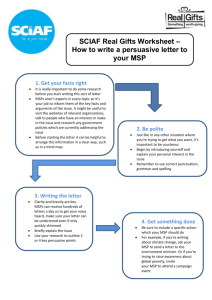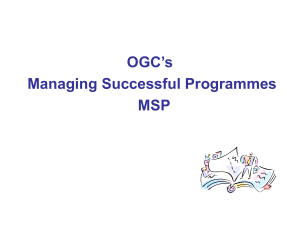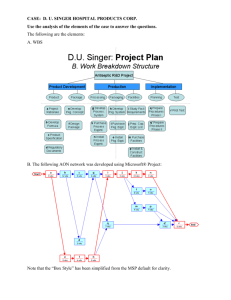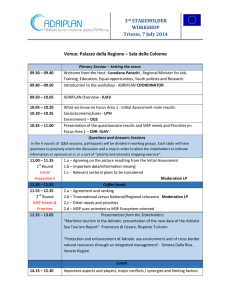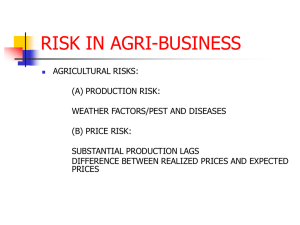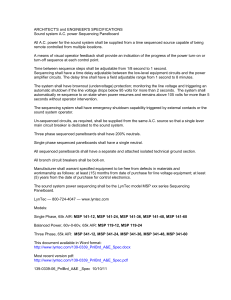the original PowerPoint presentation
advertisement
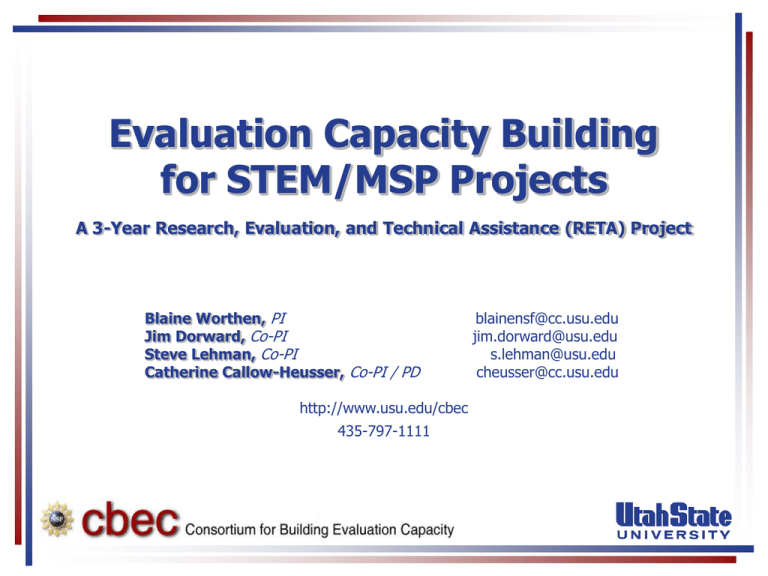
Evaluation Capacity Building for STEM/MSP Projects A 3-Year Research, Evaluation, and Technical Assistance (RETA) Project Blaine Worthen, PI Jim Dorward, Co-PI Steve Lehman, Co-PI Catherine Callow-Heusser, Co-PI / PD http://www.usu.edu/cbec 435-797-1111 blainensf@cc.usu.edu jim.dorward@usu.edu s.lehman@usu.edu cheusser@cc.usu.edu Project Goals Build evaluation capacity of MSP projects and their stakeholders by assisting them to Design and implement context-sensitive, “user-friendly” evaluation approaches Develop and sustain a “Culture of Evidence” supporting data-based decision-making Project Objectives Assist MSP projects and their stakeholders to Describe their contexts and identify their information needs Develop evaluation models based on those contexts and needs Collect and analyze evidence to support decision-making in the five MSP focus areas • • • • • Partnership challenges and opportunities Teacher quality, quantity, and diversity Challenging courses and curricula Evidence-based outcomes Institutional change and sustainability Major Project Activities Needs Assessment and Evaluation Model Development • • Solicit input from MSP partners and other stakeholders on information needs Develop models of evaluation and accountability that are sensitive to these needs Evaluation Consulting Assistance • • Solicit input from MSP partners and stakeholders on evaluation assistance needed Provide support by having nationally recognized evaluators available to work with a limited number of MSP projects Community Building • Promote communication among people interested in improving evaluation and accountability processes of NSF projects Evaluation Training • Offer workshops and other training venues for MSP project key personnel and evaluators as well as other stakeholders Evaluation Assistance USU project team and veteran evaluation practitioners funded for on-site and remote consultation • Formative review of strategic plans and/or evaluation plans • On-going evaluation assistance Annual meeting of MSP personnel and other stakeholders to provide additional evaluation assistance and share “lessons learned” On-line resources including • Searchable database of math/science evaluation resources • Evaluation planning guide Network for Evaluation Assistance (Other evaluation consultants may be added) James Altschuld Ohio State University Frank Davis Lesley College Molly Engle Oregon State University Joy Frechtling Westat, Inc., Rockville, MD Frances Lawrenz University of Minnesota Mel Mark Pennsylvania State University Rita O’Sullivan UNC, Chapel Hill Hallie Preskill University of New Mexico Tanya Suarez Fayetteville State University Charles Thomas George Mason University Rosalie Torres Torres Consulting Group Art White Ohio State University Kathy Zantal-Wiener ZW Associates Evaluation Model Development Guided by an Advisory Committee composed of expert evaluators and math/science educators Focused on • Involving MSP projects and other stakeholders in the development of evaluation models and accountability systems relevant to their context • Creating models and methods that are appropriate for the complexity of today’s math and science education programs • Measuring relationships between project activities and teacher and student outcomes Advisory Committee James Altschuld Ohio State University Rolf Blank Council of Chief State School Officers, Washington, DC Audrey Champagne State University of New York, Albany Frank Davis Lesley College John Dossey Illinois State University Arlen Gullickson Evaluation Center, WMU David Kumar Florida Atlantic University Frances Lawrenz University of Minnesota Donna Mertens Gallaudet University Thomas Romberg University of Wisconsin, Madison James Sanders Western Michigan University Roland Tharp University of California, Santa Cruz Iris Weiss Horizon Research, Inc., Chapel Hill, NC Wayne Welch University of Minnesota Community Building Promote communication among MSPs, RETAs, and stakeholders in the math/science education community Involve a broad range of expertise • Cultural psychologists and ethnologists • Cognitive scientists • Policy evaluators Establish the Consortium for Building Evaluation Capacity (CBEC) to assist collaboration and dissemination • http://www.usu.edu/cbec/ Evaluation Training Solicit information about evaluation needs Hold annual working meetings where evaluation experts facilitate problem-solving and discussion Assist MSP project teams to • • • • • Link project activities to outcomes Improve evaluation plans Identify instruments Implement evaluation activities Communicate evaluation results Provide opportunities for networking
